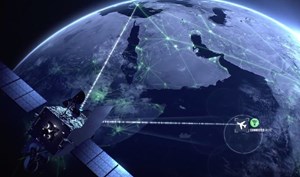Tech Mahindra launches a sports cloud platform built on AWS to provide an immersive fan experience globally
SOURCE: HTTPS://WWW.MAHINDRA.COM/
NOV 27, 2023
Security and privacy concerns prevent effective use of IoT data, Inmarsat research shows
SOURCE: WORLDOIL.COM
FEB 24, 2022

Research by Inmarsat, a global, mobile satellite communications company, reveals relatively few businesses derive maximum benefit from the Internet of Things (IoT) data that they gather.
Most of today’s businesses only share IoT data within their own organizations, with security and privacy concerns preventing them from disseminating it to organizations in their wider supply chains. Infrequent data collection and lacking an IoT data strategy leaves many businesses surveyed struggling to extract full value from their IoT data.
A more strategic, ambitious and open approach to gathering and sharing non-sensitive data could unlock substantial benefits for business struggling to make the most of IoT projects.
Collecting and sharing the right data at the right time enables companies and their partners to take better, more proactive decisions across the value chain to optimise operations as soon as a problem occurs, or even anticipate and mitigate it before it happens. Such data driven insight can help businesses reduce waste, increase productivity, improve customer service and run more sustainable operations.
The research was based on the interviews of 450 global respondents across the agriculture, electrical utilities, mining, oil and gas, and transport and logistics sectors. According to the research, of those who worked in oil and gas, as many as 89% of respondents admit their organization does not use the data collected from IoT projects as effectively as it could.
This is despite high levels of IoT adoption overall. The most prevalent barriers are security and data privacy concerns, cited as a barrier by over half (53%) of all respondents, closely followed by a lag between data collection and availability (52%) and followed by the lack of an IoT data strategy (34%).
Accelerating IoT adoption over the course of the Covid-19 pandemic has highlighted the fact that many businesses’ data sharing strategies are not yet as advanced as they need to be. Currently, only 16% of all oil and gas organizations make non-sensitive IoT data available to anyone in their organization, and to their partners, to access and to use. Conversely, just over two in five (43%) limit the use of IoT data to certain departments involved in their IoT projects. However, this is set to change, with a larger proportion of oil and gas organizations (41%) shifting towards sharing data with their wider supply chain and far fewer (16%) planning on limiting IoT data to specific departments. This change is occurring as more businesses come to understand that the responsible and secure sharing of IoT data is a necessary step towards unlocking the maximum value of that data.
The research reveals that having a formal IoT data strategy is a vital step towards drawing the optimum benefits from the technology, ensuring data is produced, shared, and analysed between the right parties at the right time. Oil and gas organizations with a formal IoT strategy are far more likely to gather data points in their IoT projects in real time (68% of respondents compared to only 15% amongst organizations without an IoT strategy).
There is also a notable difference in how strategic oil and gas businesses are in the usage of their IoT data based on the region they operate in. While only 25% of Asia Pacific businesses struggle to use IoT data effectively due to the lack of an IoT data strategy, this increases to 30% of organizations in North America and 55% in Russia and the Stans.
“Despite the oil and gas sector making great strides in their usage of IoT data, oil and gas companies could do more to unlock greater value from it,” said Damian Lewis, Market Development Manager at Inmarsat Enterprise. “The lack of formal IoT strategies is one of the main barriers restricting oil and gas companies from leveraging their data as effectively as they might.”
Data and insight are essential to success and implementing a clear IoT data strategy can ensure that oil and gas companies’ data is effectively communicated internally and across the supply chain, Lewis said.
“While our latest research shows that the majority of today’s organizations are now gathering IoT data, there is still plenty more that businesses need to do to derive the maximum benefit from it,” said Mike Carter, President of Inmarsat Enterprise. “The ultimate measure of an IoT project’s success is how it improves the way a company and its partner eco-system operates. This is largely resultant on the type of data extracted and how it is shared and turned into practical and actionable business insights in a timely manner.”
Carter recommends using Inmarsat’s ELERA narrowband network to enable the organization to grow, mine, extract, move, save, and inform to access, use and share IoT data anywhere.
LATEST NEWS
Augmented Reality
Hi-tech smart glasses connecting rural and remote aged care residents to clinicians
NOV 20, 2023
WHAT'S TRENDING


Data Science
5 Imaginative Data Science Projects That Can Make Your Portfolio Stand Out
OCT 05, 2022

SOURCE: HTTPS://WWW.MAHINDRA.COM/
NOV 27, 2023
SOURCE: HTTPS://WWW.IOTTECHNEWS.COM/
OCT 27, 2023
SOURCE: HTTPS://WWW.THEDAILYSTAR.NET/CAMPUS/
OCT 01, 2023
SOURCE: HTTPS://WWW.IOTFORALL.COM/
SEP 11, 2023
SOURCE: HTTPS://WWW.IOTTECHNEWS.COM/
AUG 10, 2023
SOURCE: HTTPS://WWW.SCIENCEDAILY.COM/
AUG 11, 2023